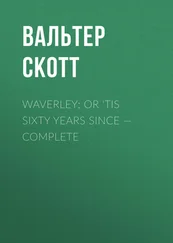Andrew Lang - Waverley; Or, 'Tis Sixty Years Since
Здесь есть возможность читать онлайн «Andrew Lang - Waverley; Or, 'Tis Sixty Years Since» — ознакомительный отрывок электронной книги совершенно бесплатно, а после прочтения отрывка купить полную версию. В некоторых случаях можно слушать аудио, скачать через торрент в формате fb2 и присутствует краткое содержание. Издательство: Иностранный паблик, Жанр: foreign_antique, foreign_prose, на английском языке. Описание произведения, (предисловие) а так же отзывы посетителей доступны на портале библиотеки ЛибКат.
- Название:Waverley; Or, 'Tis Sixty Years Since
- Автор:
- Издательство:Иностранный паблик
- Жанр:
- Год:неизвестен
- ISBN:нет данных
- Рейтинг книги:4 / 5. Голосов: 1
-
Избранное:Добавить в избранное
- Отзывы:
-
Ваша оценка:
- 80
- 1
- 2
- 3
- 4
- 5
Waverley; Or, 'Tis Sixty Years Since: краткое содержание, описание и аннотация
Предлагаем к чтению аннотацию, описание, краткое содержание или предисловие (зависит от того, что написал сам автор книги «Waverley; Or, 'Tis Sixty Years Since»). Если вы не нашли необходимую информацию о книге — напишите в комментариях, мы постараемся отыскать её.
Waverley; Or, 'Tis Sixty Years Since — читать онлайн ознакомительный отрывок
Ниже представлен текст книги, разбитый по страницам. Система сохранения места последней прочитанной страницы, позволяет с удобством читать онлайн бесплатно книгу «Waverley; Or, 'Tis Sixty Years Since», без необходимости каждый раз заново искать на чём Вы остановились. Поставьте закладку, и сможете в любой момент перейти на страницу, на которой закончили чтение.
Интервал:
Закладка:
Walter Scott
Waverley; Or, 'Tis Sixty Years Since
EDITOR’S NOTE
The purpose of the added matter in this edition of the Waverley Novels – a reprint of the magnum opus of 1829-1832 – is to give to the stories their historical setting, by stating the circumstances in which they were composed and made their first appearance.
Sir Walter’s own delightful Introductions, written hastily, as Lockhart says, and with a failing memory, have occasionally been corrected by Lockhart himself. His “Life of Scott” must always be our first and best source, but fragments of information may be gleaned from Sir Walter’s unpublished correspondence.
The Editor owes to the kindness of Mrs. Maxwell Scott permission to examine the twenty-four large volumes of letters to Sir Walter, and some other manuscripts, which are preserved at Abbotsford. These yield but little of contemporary criticism or remark, as is natural, for Scott shared his secret with few, and most topics were more grateful to him than his own writings. Lockhart left little for his successors to do, and the more any one studies the Abbotsford manuscripts, the more must he admire the industry and tact of Scott’s biographer.
The Editor has also put together some examples of contemporary published criticism which it is now not uninteresting to glance over. In selecting these he has been aided by the kindness of Mrs. Ogilbie. From the Abbotsford manuscripts and other sources he has added notes on points which have become obscure by lapse of time. He has especially to thank, for their courteous and ready assistance, Lady Napier and Ettrick, who lent him Sir Walter’s letters to her kinswoman, the Marchioness of Abercorn; Mr. David Douglas, the editor and publisher of Scott’s “Journal,” who has generously given the help of his antiquarian knowledge; and Mr. David MacRitchie, who permitted him to use the corrected proofs of “Redgauntlet.”
ANDREW LANG
ADVERTISEMENT TO THE WAVERLEY NOVELS
It has been the occasional occupation of the Author of Waverley, for several years past, to revise and correct the voluminous series of Novels which pass under that name, in order that, if they should ever appear as his avowed productions, he might render them in some degree deserving of a continuance of the public favour with which they have been honoured ever since their first appearance. For a long period, however, it seemed likely that the improved and illustrated edition which he meditated would be a posthumous publication. But the course of the events which occasioned the disclosure of the Author’s name having, in a great measure, restored to him a sort of parental control over these Works, he is naturally induced to give them to the press in a corrected, and, he hopes, an improved form, while life and health permit the task of revising and illustrating them. Such being his purpose, it is necessary to say a few words on the plan of the proposed Edition.
In stating it to be revised and corrected, it is not to be inferred that any attempt is made to alter the tenor of the stories, the character of the actors, or the spirit of the dialogue. There is no doubt ample room for emendation in all these points, – but where the tree falls it must lie. Any attempt to obviate criticism, however just, by altering a work already in the hands of the public is generally unsuccessful. In the most improbable fiction, the reader still desires some air of vraisemblance, and does not relish that the incidents of a tale familiar to him should be altered to suit the taste of critics, or the caprice of the Author himself. This process of feeling is so natural, that it may be observed even in children, who cannot endure that a nursery story should be repeated to them differently from the manner in which it was first told.
But without altering, in the slightest degree, either the story or the mode of telling it, the Author has taken this opportunity to correct errors of the press and slips of the pen. That such should exist cannot be wondered at, when it is considered that the Publishers found it their interest to hurry through the press a succession of the early editions of the various Novels, and that the Author had not the usual opportunity of revision. It is hoped that the present edition will be found free from errors of that accidental kind.
The Author has also ventured to make some emendations of a different character, which, without being such apparent deviations from the original stories as to disturb the reader’s old associations, will, he thinks, add something to the spirit of the dialogue, narrative, or description. These consist in occasional pruning where the language is redundant, compression where the style is loose, infusion of vigour where it is languid, the exchange of less forcible for more appropriate epithets – slight alterations in short, like the last touches of an artist, which contribute to heighten and finish the picture, though an inexperienced eye can hardly detect in what they consist.
The General Preface to the new Edition, and the Introductory Notices to each separate work, will contain an account of such circumstances attending the first publication of the Novels and Tales as may appear interesting in themselves, or proper to be communicated to the public. The Author also proposes to publish, on this occasion, the various legends, family traditions, or obscure historical facts which have formed the ground-work of these Novels, and to give some account of the places where the scenes are laid, when these are altogether, or in part, real; as well as a statement of particular incidents founded on fact; together with a more copious Glossary, and Notes explanatory of the ancient customs and popular superstitions referred to in the Romances.
Upon the whole, it is hoped that the Waverley Novels, in their new dress, will not be found to have lost any part of their attractions in consequence of receiving illustrations by the Author, and undergoing his careful revision.
ABBOTSFORD, January, 1829.
GENERAL PREFACE TO THE WAVERLEY NOVELS
And must I ravel out
My weaved-up follies?
Having undertaken to give an Introductory Account of the compositions which are here offered to the public, with Notes and Illustrations, the Author, under whose name they are now for the first time collected, feels that he has the delicate task of speaking more of himself and his personal concerns than may perhaps be either graceful or prudent. In this particular he runs the risk of presenting himself to the public in the relation that the dumb wife in the jest-book held to her husband, when, having spent half of his fortune to obtain the cure of her imperfection, he was willing to have bestowed the other half to restore her to her former condition. But this is a risk inseparable from the task which the Author has undertaken, and he can only promise to be as little of an egotist as the situation will permit. It is perhaps an indifferent sign of a disposition to keep his word, that, having introduced himself in the third person singular, he proceeds in the second paragraph to make use of the first. But it appears to him that the seeming modesty connected with the former mode of writing is overbalanced by the inconvenience of stiffness and affectation which attends it during a narrative of some length, and which may be observed less or more in every work in which the third person is used, from the Commentaries of Caesar to the Autobiography of Alexander the Corrector.
I must refer to a very early period of my life, were I to point out my first achievements as a tale-teller; but I believe some of my old schoolfellows can still bear witness that I had a distinguished character for that talent, at a time when the applause of my companions was my recompense for the disgraces and punishments which the future romance-writer incurred for being idle himself, and keeping others idle, during hours that should have been employed on our tasks.
Читать дальшеИнтервал:
Закладка:
Похожие книги на «Waverley; Or, 'Tis Sixty Years Since»
Представляем Вашему вниманию похожие книги на «Waverley; Or, 'Tis Sixty Years Since» списком для выбора. Мы отобрали схожую по названию и смыслу литературу в надежде предоставить читателям больше вариантов отыскать новые, интересные, ещё непрочитанные произведения.
Обсуждение, отзывы о книге «Waverley; Or, 'Tis Sixty Years Since» и просто собственные мнения читателей. Оставьте ваши комментарии, напишите, что Вы думаете о произведении, его смысле или главных героях. Укажите что конкретно понравилось, а что нет, и почему Вы так считаете.












